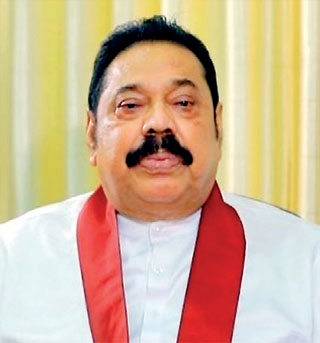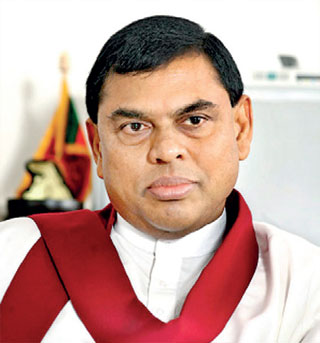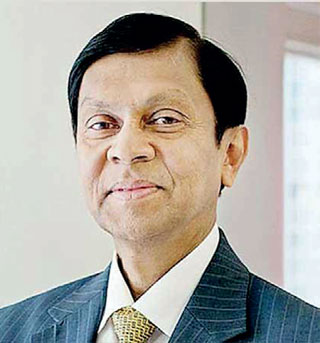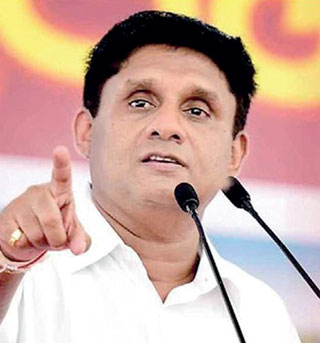Saturday Feb 14, 2026
Saturday Feb 14, 2026
Friday, 10 December 2021 01:05 - - {{hitsCtrl.values.hits}}

President Gotabaya Rajapaksa

Prime Minister Mahinda Rajapaksa

Finance Minister Basil Rajapaksa

Central Bank Governor Nivard Cabraal

Opposition and SJB Leader Sajith Premadasa
|
 The present situation of Sri Lanka can be compared to a complex puzzle which seems unsolvable. Here are some of its key features: The country is in a terrible state of rapid catastrophe. The crisis facing the country cannot be considered as a product of this Government alone. It is a distinct crisis caused by misguided, destructive, predatory, corrupt and stupid policies of successive governments that have ruled Sri Lanka from time to time for a long time without facing strong resistance from Opposition parties and also in the absence of any attempt to rectify the errors as and when they occurred.
The present situation of Sri Lanka can be compared to a complex puzzle which seems unsolvable. Here are some of its key features: The country is in a terrible state of rapid catastrophe. The crisis facing the country cannot be considered as a product of this Government alone. It is a distinct crisis caused by misguided, destructive, predatory, corrupt and stupid policies of successive governments that have ruled Sri Lanka from time to time for a long time without facing strong resistance from Opposition parties and also in the absence of any attempt to rectify the errors as and when they occurred.
Although the incumbent Government may not have been able to prevent the devastation caused by the crisis completely, at least it should have opened the door to a program of structural reforms to reform and recreate the system. Also, by launching a pragmatic program to manage the crisis optimally, it could have significantly minimised the damage to the country.
Paucity of vision
The incumbent President has not only failed to anticipate the crisis the country faced before coming to power, but has also been unable to grasp it deeply even after coming to power. So much so, the crisis has not been managed in an optimal way, but in a manner that would exacerbate the chaos, aggravating the impending catastrophe.
The President did not have any previous experience in politics or statecraft; the country he inherited to rule was not in a state that could be ruled easily, but one that was in utter chaos, not easy to govern even by an experienced or a veteran ruler.
On the other hand, the incumbent President came to power with a large number of Memoranda of Understanding (MoUs) entered into with a significant number of cronies, as done by other presidents. Unlike the other presidents, the election campaign of the incumbent President’s was a long one, and consequently his cronies had to incur a very high cost for his presidential campaign compared to that of the other presidents.
In this crisis situation, exacerbated by the breakdown of the system, the President who is inexperienced was obliged to act arbitrarily and outside the established system. The President initially thought that the crisis facing Sri Lanka was one which is trivial compared to the victory gained at the concluding phase of the last internal civil war as Defence Secretary. The crisis in Sri Lanka was perceived to be a simple issue that could be easily overcome with the support of the security forces. This can be considered as a serious mistake committed by the President.
Instead of relying on experienced and educated bureaucrats, the President who is inexperienced chose to rely on equally inexperienced and superficial theoreticians who had beautiful utopian views; this can be considered another instance where he has gone wrong.
The best example of this is the ban imposed on chemical fertilisers and agrochemicals and the resultant gigantic crisis in agriculture. Despite the economic downturn and the unbearable pressure on the people, the President has pursued a policy that allowed his cronies to exploit to the maximum. This situation has not only exacerbated the crisis in the country but also served as an important factor in undermining public confidence in the President.
Aggravating the problems
The President came to power with a huge mandate, but that mandate is now in a state of complete evaporation. There has hardly been any government in Sri Lanka that has become so unpopular, so soon. The crisis in the country is on the verge of an uncontrollable catastrophe.
The balance of payments crisis remained at a point where it could have been resolved by resorting to the International Monetary Fund (IMF) and obtaining necessary credit facilities though it would have involved certain oppressive conditions. Whoever may be the person who persuaded the President not to solicit the support of the IMF, claiming that there are other alternatives to resolve the crisis, the damage he has done, knowingly or unknowingly, to the country as well as to his President is immense. This stupid and destructive policy, at one point, will end up in plunging the whole country into a situation which is collapsed, paralysed, failed and anarchic.
The picture that looms ahead for Sri Lanka is not rosy at all. The banking system of Sri Lanka might experience a total collapse. The value of deposits in savings accounts will evaporate. Inflation will become an unbearable burden and the amount of money needed to buy goods will be as huge as the quantum of goods purchased. With the breakdown of fuel supply which is essential for electricity and transport, the collapse of the system will reach completion.
When will this crash happen? Most probably it is likely to happen more or less a year from today, before the next Presidential Election. It is not difficult to understand the limit of the Government’s ability to deal with such a situation.
Do the Opposition parties possess a far-reaching vision to face a situation like that? How is the Opposition trying to seize power without an election? At the moment, the focus of the Opposition is not on the crisis or its outcome, but on the forthcoming Presidential Election. There again, no one talks formally about the reforms they intend to introduce if they win the next Presidential Election.
What is their policy on the presidential system? If they intend to maintain the present system, will they at least place the president below the law, who at present remains above the law? Do they grant the power to the Judiciary to annul the actions of a president when they are found to be contrary to the law? Do they take measures to put an end to the illegal looting of public property being carried out in various ways by the president and the MPs of the ruling party working together as a gang? What are the policies and arrangements made to stop that?
Will laws be enacted to control party funds and election funds? Will the laws be enacted to ensure the internal democracy of the political parties? In what way are they planning to promote national unity which is already disintegrated? Shouldn’t the Opposition parties have a responsibility to make the public aware of such fundamental issues in advance?
Solving the puzzle
The political puzzle, which is not easy to solve, is constructed on the question of what should be done if the entire system collapses before the next Presidential Election, creating an atmosphere in which the next election cannot be held.
Now Sri Lanka remains on the threshold of such a serious danger. But Sri Lanka, which has failed to foresee the current crisis in advance, is unlikely to be able to anticipate the more complex crisis to come. The most prudent thing that can be done for the security of the country would be to acknowledge the fact that the country is in grave danger, and reach a consensus between the ruling party and the Opposition on the need for adopting necessary reforms to prevent such a situation from arising.
The authority to decide whether the system should be reformed or recreated so that a complete change is made to the entire system could be passed on to the people by a referendum. Whether it is a simple reform program or one that aims at a complete change in the overall system, it will require a constitutional amendment or formulation of a new constitution. In this case, the public could be consulted to find out what they desire, whether they want a constitutional amendment or a new constitution.
If they demand a new constitution, the question of whether it should be formulated by a constitutional assembly headed by the Parliament or by a constitutional assembly consisting of public representatives elected exclusively for the purpose could be directed to a referendum. If the constitution is not formulated by Parliament, the authority to make a constitution and reforms can be delegated to a constitutional assembly appointed by a by-law. Then the next election will be held after overcoming the crisis and making the necessary reforms. There are some people in the country who believe that the people of Sri Lanka do not possess the adequate knowledge and discipline required for such a comprehensive public program. The most common example cited for this is the manner in which the people have exercised their vote at the last Presidential Election.
Prior to that, it was the same people who defeated Mahinda Rajapaksa who had built a formidable image that he could not be defeated at the 2015 Presidential Election. The failure of the Yahapalana Government had caused great frustration in them while the Easter Sunday attacks had left them in a state of severe mental shock.
No matter how great the victory of Gotabaya has been, the people have abandoned their loyalty to him and taken a firm stand protesting vigorously against the Government when they observed that the policies being pursued by the President were not good and not in keeping with their aspirations. In this context, the courage displayed by some health officials in the COVID issue as well as some high-ranking officials in the field of agriculture in regard to the agro-fertiliser issue can be considered highly commendable and eternal.
The people in many countries which have adopted people’s constitutions or participatory constitutions successfully are relatively ignorant compared to the people of Sri Lanka. The volume of bloodshed in some countries is rather appalling. The best option to overcome the crisis facing Sri Lanka would be to direct the country to adopt a people’s constitution.